To provide the best experiences, we use technologies like cookies to store and/or access device information. Consenting to these technologies will allow us to process data such as browsing behaviour or unique IDs on this site. Not consenting or withdrawing consent, may adversely affect certain features and functions.
The technical storage or access is strictly necessary for the legitimate purpose of enabling the use of a specific service explicitly requested by the subscriber or user, or for the sole purpose of carrying out the transmission of a communication over an electronic communications network.
The technical storage or access is necessary for the legitimate purpose of storing preferences that are not requested by the subscriber or user.
The technical storage or access that is used exclusively for statistical purposes.
The technical storage or access that is used exclusively for anonymous statistical purposes. Without a subpoena, voluntary compliance on the part of your Internet Service Provider, or additional records from a third party, information stored or retrieved for this purpose alone cannot usually be used to identify you.
The technical storage or access is required to create user profiles to send advertising, or to track the user on a website or across several websites for similar marketing purposes.
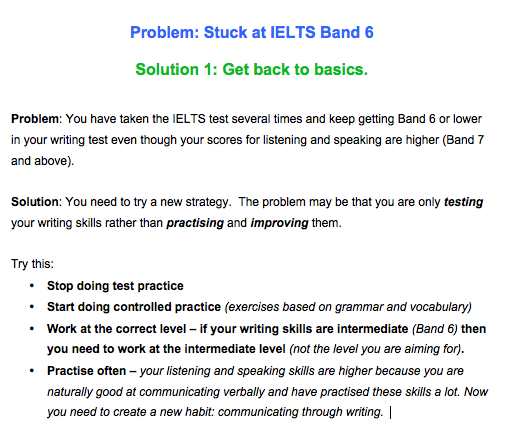
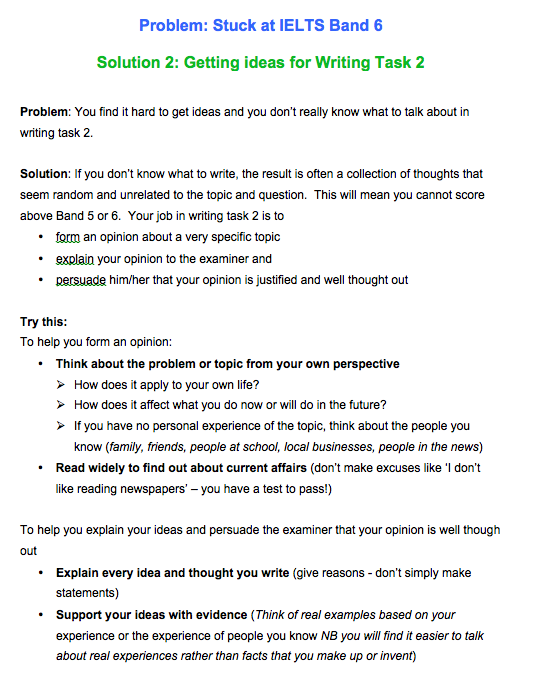
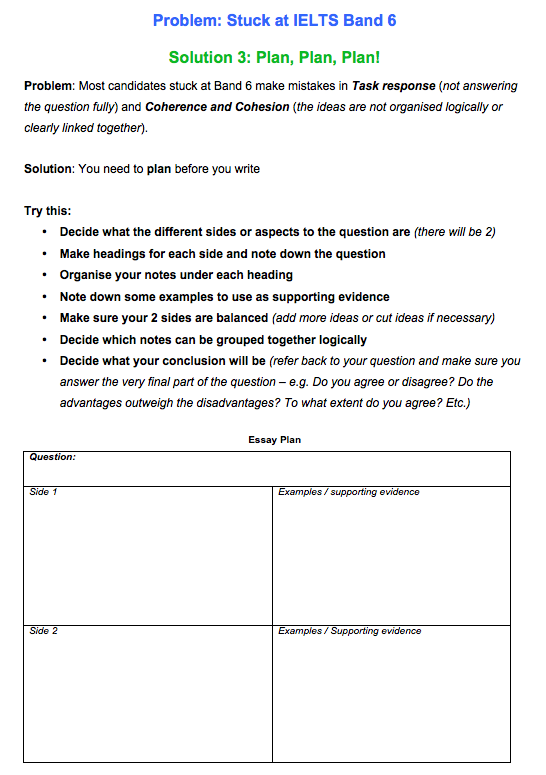
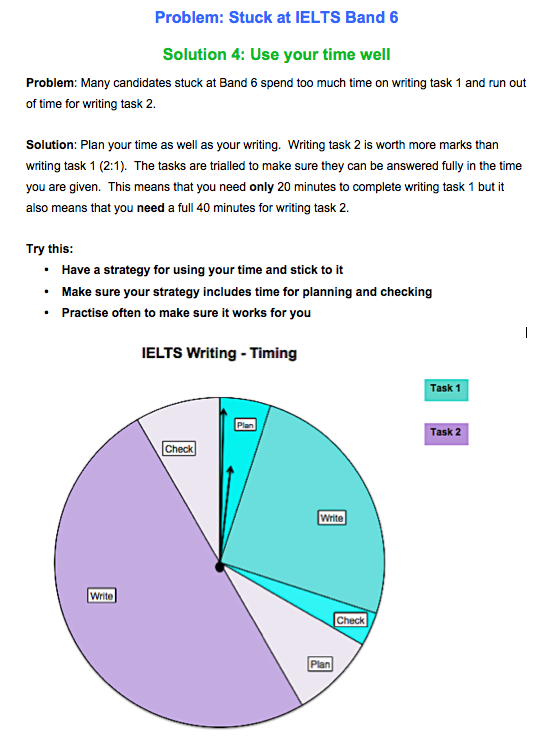
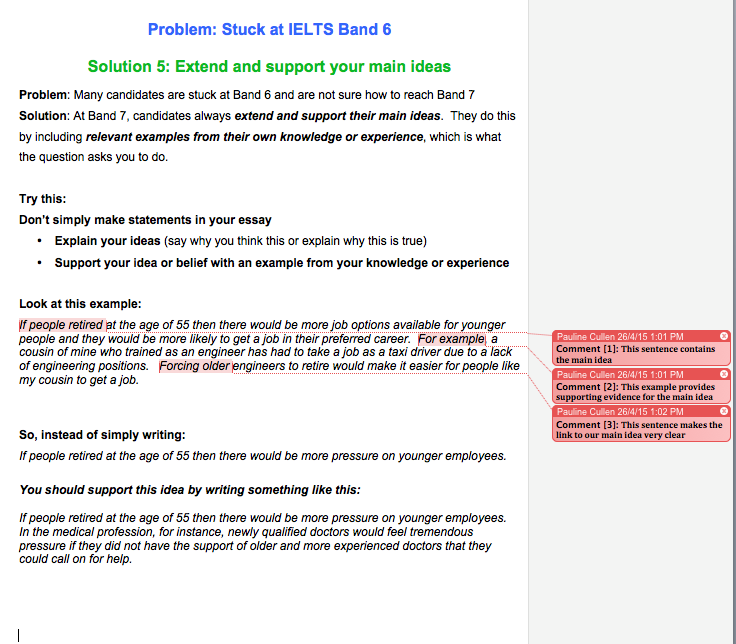
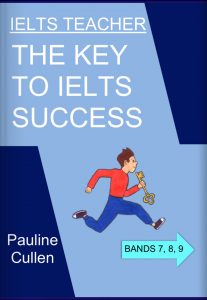



Dear Pauline,
This post throws light over one of the most pressing issues for me: How to generate ideas, how to link them, how to write a
single paragraph- in short, it’s like a skeleton for explaining how to generate ideas and jot them down. I haven’t
completed reading your free book yet, but after reading this post I came across certain questions which I would like to ask
you; would be grateful if you could assist me.
In the example: If people retired at age of 55 there would be more options available ……
Here you’ve written 3 comments as explanation: in one you mentioning main idea, second you stating its supporting example
for main idea and third is implicitly link to the main idea.
But you said after writing main idea before stating example we have to give reasons ( why we think like this or reasons for
our main idea-not only sentences).Yet, in sample provided above I feel like reasons are skipped or I can not pick it up.
Can you explain where is reason in this example.
Thanking you in advance.
Anam
Dear Pauline,
Apart from queries, I have tried to write a single paragraph using your approach which you mentioned in your latest post- Tips for solving band 6 problems
Can you have a look on the paragraph which I have written following your advice; Did I managed to grasp what you taught in the post or I need to look at post through other aspects as well.
Question is from Cambridge IELTS 8 book:
Nowadays the way many people interact with each other has changed because of technology. In what ways has technology affected the types of relationships people make? Has this become a positive or negative development?
Communications Industry have made quantum leap in the past two decades at rate unparalleled since its birth. It has virtually reincarnated the mode of communication; making human’s interaction possible ‘anytime and anywhere’ in the world. Like in previous times, if they had to send a message to their loved ones or apply for a job they would write a letter to the concerned person and it would take weeks or sometimes even months, depending upon the distance, to reach its desired destination. Whereas now if they have to talk to their friends and family or send their resume for the job, they can do it no time by virtue of high-tech systems.
I have attempted to write body paragraph one for this question.In addition to it I think its a postive development which I will convey explicitly in conclusion.But what I feel personally, I didnt use personal pronoun in this sample paragraph.Should I use?
NB.I wrote it to show you have i grasped the concept of logically writing a paragraph.
Sincerely,
Anam
Hi Pauline
I am a bit confused about the question types in parts 1&3 of the speaking test. If the questions in part 3 are not personally-focused , why there are sometimes personal questions in part 3 like the ones in Unit 12 of VOCABULARY FOR IELTS in the practice test on page 67.
The question are :
1) If you could buy any new gadget you wanted , what would you choose and why ?
2) Do you always want to buy the latest technology or are you happy with an older model ?
Thanks for all the help and feedback you provide !
Hi Jahangir, the examiner will often ask a few follow-up questions based on the talk in part 2 before moving on to the more general questions in part 3. I have tried to reflect this here. Also, it’s important to remember that this is a course book, so it is aiming to teach more than to simply test. So, each exercise aims to help you practice the vocabulary topic in as many ways related to the test as possible. Here, I have tried to help you produce and practice the kind of language that a higher level candidate can produce. So, these questions are a little more leading (i.e. giving you a hypothetical situation so help you practice producing conditionals etc.
dear pauline,
I write a essay and my teacher gave me a 6 for CC because of one of my body paragraph which included two solutions about two causes that i wrote above in 2 separated paragraphs. My teacher said that these two solutions should be in 2 separated bodies due to irrelevant problems. It means that i should write 2 paragraph for causes and 2 for solutions. what is your opinion?
The questions was from Academic Cambridge 13, test 4 : In spite of the advances of agriculture, many people around the world still go hungry. Why? What can be done?
thanks
Hi Nikoo, it isn’t possible to say without seeing the answer. For me, an essay like that would have 2 body paragraphs: 1) discussing the problems 2) discussing possible solutions. However, if the problems you raised are very different to each other, and do not seem to the relevant to the main issue or the essay topic, this can cause problems.
Hi pauline,
First I am very grateful for your quick respond. Two problems that i discuss were about 1. outgrowing of population in the world considering the confined food resources 2. The increasing amount of food-waste especially in third-world countries which suffer more from the hunger than the developed one’s.
How about these above mentioned points?
Hi Nikoo, can you share the whole paragraph/s with me? This will help me give clear feedback. (I find that when people explain their argument or ideas they use language that is clear and easy to follow, but then when they write out their paragraphs the language and ideas become overly complicated. I also find that people will sometimes say something like ‘I explain the problem and then I give an example.’ but there is no clear explanation and the example is not related or is not actually an example.)
Hi Pauline,
Could you explain how to organise ideas ‘logically’?
What is meant by ‘logically’? If possible could you give an example?
Essentially, it means choosing one idea to discuss at a time instead of jumping around to different ideas in no particular order.